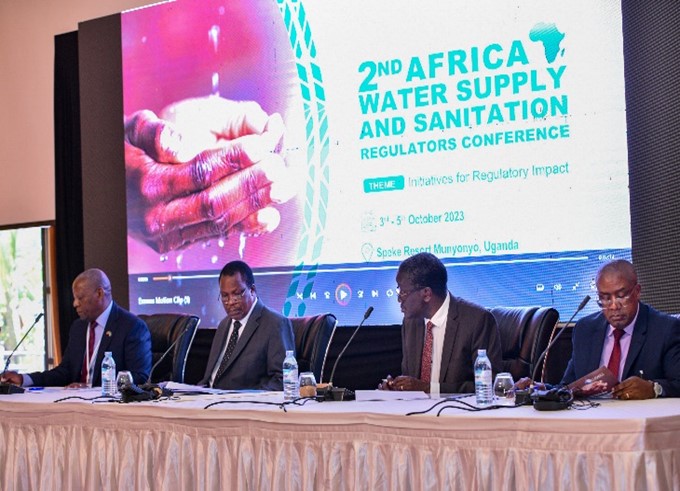Hosted by the Water Utility Regulation Department (WURD) of the Ministry of Water and Environment in Uganda, the 2nd Africa Water Supply and Sanitation Regulators Conference was held from 3rd to 5th October 2023 at Munyonyo Resort and Conference Centre, under the theme “Initiatives for Regulatory Impact”. This conference was attended by more than 150 participants from 44 African countries and over 18 partners supporting regulation. Delegates included representatives of institutions with regulatory mandate, Ministries, utilities and partners such as AMCOW, AFUR, AfWASA, BMGF, WHO, UNICEF, WIN, WSUP, among others.
The theme of this conference was grounded on ESAWAS’ cognisance of the fact that, while implementation of regulation should align with the specific context of a country, the principles of regulation are the same. This allows for sharing of knowledge and experience for adoption and adaptation of good practices. Thus, the conference was an opportunity to showcase various initiatives instituted by regulators, policy makers and stakeholders to address sector challenges and create positive lasting impacts in the WSS sector through effective regulation. The conference also served as a podium for gathering evidence on the beneficial role of regulation on WSS service provision.
The Chairperson of ESAWAS, Mr Balthazar Nganikiye, in his welcoming remarks, provided a brief background of the Association and highlighted the key achievements of the period. These include the technical assistance and advocacy provided to countries wishing to establish WSS Regulators or strengthen existing regulatory institutions; support to members for the implementation of Citywide Inclusive Sanitation and the implementation of a public data systems strengthening strategy that will assist countries to improve the accuracy and reliability of data. Other notable achievements are the capacity building of members in various aspects of regulation and the development of the feasibility strategy for a dedicated Africa-based WSS regulation training centre. Speaking of the conference theme, the ESAWAS chairperson flagged the role of WSS regulators in meeting SDG 6 targets, stressing the importance of learning and possibly adopting successful initiatives put in place to accelerate improvements in WSS service provision.

The opening of the conference was officiated by Honorable Sam Cheptoris, the Minister of Water and Environment in Uganda. In his speech, he lauded the efforts and collaboration between ESAWAS and the Ministry in coordinating the conference. He emphasized the role of effective WSS regulation in achieving the SDGs, but also the national development agendas by improving service coverage, quality and sustainability while ensuring access to service by vulnerable and low-income populations. Referring to the detrimental impacts of climate change on water and sanitation services, he implored the conference participants to devise and implement mitigation and adaptation measures to address not only climate change impacts but also effects of population growth, rapid urbanisation and other global uncertainties.
The opening ceremony also featured keynote presentations and remarks. Speaking on behalf of the Executive Secretary of AMCOW, Mr Thomas Banda provided insights on policy initiatives to support regulation. The video remarks by Mr Osward Chanda of the African Development Bank and Mr Gustavo Saltiel of World Bank outlined the Banks’ support programmes for strengthening WSS regulation. Mr James Manda, the Technical Manager at African Forum of Utility Regulators presented the key emerging areas for consideration in regulation.
The ESAWAS Executive Secretary gave a keynote presentation outlining the aspects to be discussed during the conference that demonstrate that the cost of non-regulation is higher than the cost of establishing a regulator. This was covered in various technical presentations grouped into the following three categories:
Initiatives in policy, legal and regulatory mechanisms
- Effective Regulatory framework in an evolving sub-national water sector – positive impacts of establishing the state regulator and the development of adequate regulations on water and sanitation in Ekiti State of Nigeria;
- Enhancing urban sanitation regulation – various regulatory mechanisms deployed by Kampala Capital City Authority to improve onsite sanitation service delivery. These include well-defined institutional framework, PPP, compliance monitoring and enforcement;
- Regulating for impact and innovation to achieve universal access to water and sanitation services -novel incentives and tools introduced by regulators to enhance WSS service delivery to marginalized communities while ensuring affordability;
- Minding the gap: guidelines for small and rural water supplies – a preview of WHO’s guidelines for drinking water quality emphasizing risk-based regulation, management and surveillance of small water supplies.
Initiatives in regulatory tools
- Tariff policy for emerging utilities – the water tariff policy review undertaken by Uganda to cater for both on grid and off grid water and sanitation systems;
- SaniTracker Digital System – a digital solution to enhance regulatory oversight and strengthen private sector engagement and accountability in non-sewered sanitation service provision;
- SERVQUAL Model – for the evaluation of water consumer satisfaction in terms of reliability, responsiveness, assurance, tangible and empathy towards the service delivered;
- WASHREG Approach – apractical tool to improve regulation by understanding the elements of WASH regulation, identifying the gaps and providing conceptual framework for regulatory reform.
Initiatives in cooperation and joint action
- African Sanitation Leaders Program – initiated by NIYEL to build the capacity of of mid-level managers from utilities, regulators, government departments, private sector and civil society, equipping them with leadership skills needed to lead change and innovation within the sanitation sector;
- RegWAS LAC programme – which brings together regulators and authorities with regulatory and supervisory functions, governments, international organizations and experts for cooperation and joint action aiming improve public policies and regulation at scale.
Key Outcomes and Takeaways
One of the major outcomes of the conference was the endorsement of the feasibility strategy to establish a dedicated Africa-based WSS Regulation Training Centre under ESAWAS with first training courses planned to be delivered by June 2024.
Another major outcome was the resounding endorsement of the strengthening of the ESAWAS Regulators Association to continental level. Delegates lauded ESAWAS’ efforts to promote and strengthen WSS regulation and to continue doing this at a larger African continental scale. Membership of ESAWAS would thus be opened to the continent with step-wise growth.
The conference deliberations ended by highlighting the following key takeaways:
- Data Collection, analysis and interpretation is key to effective WSS regulation;
- Commitment to regulate for improved service provision through sound standards and guidelines;
- Service resilience and emergency preparedness for sustainability should be at the forefront;
- Regulators must have clear vision and agenda for what needs to be achieved to progress the sector. This will determine the kind of funding and support that comes from development partners;
- Need to support and incentivize regulatory compliance – including rewarding best performers;
- Consumer feedback should be prioritized to advise improvement of service provision;
- Regulation is a specialized field, therefore there is a need to build the capacity for the stakeholders in the areas of regulation.
As key actions, ESAWAS will continue to concert efforts in the following:
- Strengthening regulatory tools for data collection and management;
- Development of regulatory frameworks for rural and off grid WSS and service resilient services;
- Enhancing technical capacity development through the training centre;
- Widening regulatory enhancement through strategic partnerships; and
- Increasing support to non-members through formalized partnerships.
After two and half days of candid exchanges, the conference was officially closed by Eng Christopher Tumusiime, the Commissioner of the Water Utility Regulation Department of the Ministry of Water and Environment in Uganda. He commended the active participation of the delegates, the deliberations and commitment to advance WSS Regulation in Africa and globally.






